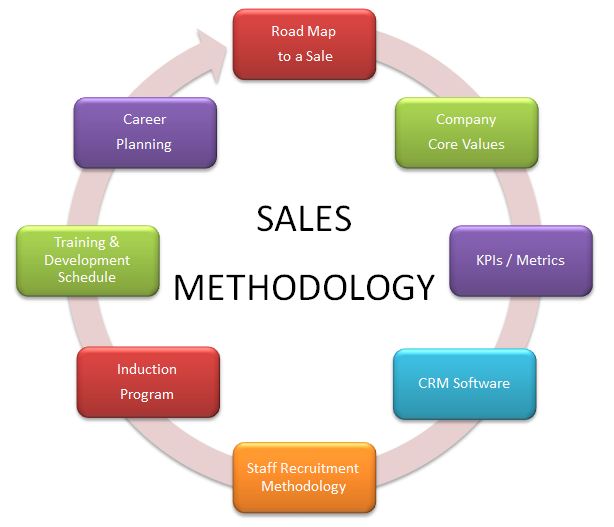Why Your Company Needs a Sales System
Mark Bradman, 31 January 2012
“Congratulations! You’ve been appointed as our new BDM. This is what we do. Here are your Sales Targets. Here is your Sales Hat. Now go out and sell. And please remember to drop by at the End of the Month so we can monitor how well you’re going…”
If that’s the extent of your organisation’s Sales System or Sales Methodology then you probably have an on-going monthly advertisement for new sales staff and a revolving door at the front of your building for crowd control.
If, however, you’re an industry leader that continually churns out sales year after year irrespective of staff turnover, the state of the world economy, and other business challenges that seemingly wipe out lesser rivals, then no doubt you have a successful Sales System or Sales Methodology at the core of your organisation.
So what does a Sales System or Sales Methodology look like?

The Road Map to a Sale is the basic component of a Sales Methodology that can be mistaken for the total system. In essence, it consists of the steps to making a sale. If you look through the internet, you’ll find numerous Sales Methodologies ranging from just a few steps to ten or more.
While no one can ever understand your business better than you do, new ideas and trends could be just the lift your business needs. Hence, your options in formalising your Sales System are:
1. Document your own system based on what you’ve found works best in your industry from your own experience and/or that of your top performers.
2. Research different methodologies and adopt one best suited to your industry.
3. Get the best of both worlds by basing your sales system on your own experience while also exploring and incorporating the ‘Best Practise’ developments in the business world.
Once you’ve documented your Road Map to a Sale, get all your staff to follow it religiously. Sounds logical enough but don’t be surprised if some sales people, who have been allowed to do things their own way for too long, try convincing you that they know better. Either they do and you’ve already incorporated what works for them as part of your company’s sales system, or find someone who is more open to learning to do things better.
If there is one point that anyone with a successful sales system will tell you it is that their top performers are those that best follow their sales system. That is not to say that you undervalue the skills, experience and personality that individuals bring to a sales role, simply that such personal attributes need to be used within the framework of what’s proven to work for you.
Some of the benefits of using a formulised Sales System are (in no particular order):
• Ability to hire top performers from outside your industry.
• Ability to hire people with limited experience and helping them to develop within your company.
• Even your top performers can miss important steps if they’re not reminded of them regularly.
• Easier to manage your sales team when you know what they should be doing.
• A culture of teamwork is more likely to result when everyone is playing from the same sheet music.
• Easier to identify areas for individual performance improvement.
• Easier to provide continuity of service to your customers when team members are absent or move on to other roles.
• Team members can learn from one another’s successes.
Remember, however, that even though your Road Map to a Sale is a Key Ingredient of your Sales System or Sales Methodology, there are other important parts as well that will support it and help your organisation to stay on track. We will discuss these in further blogs.

